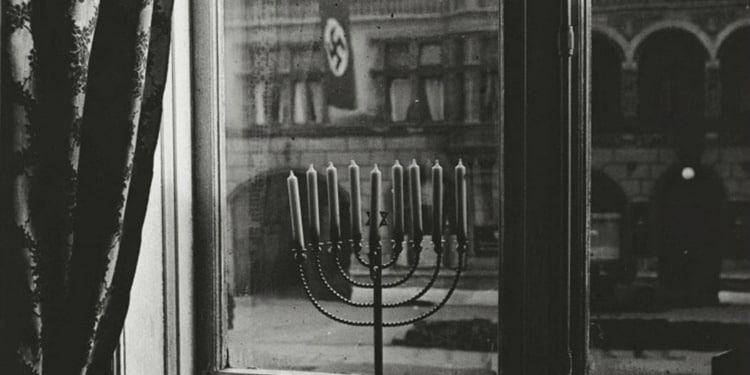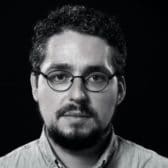
Repeated calls to “gas” or “oven” k*kes.
Repeated calls for violence and for the establishment of an all-white ethno-state.
Cheers from observers and even praise from the judge overseeing the above mentioned proceedings saying that the white suprememacists who uttered these vile words in his courtroom “represented themselves during this case for ‘a very civil proceeding.’” This isn’t reporting from a neo-Nazi rally but from a Virginia courtroom just last week.
And this is why we must continue to shine a light on antisemitism.
We must continue to shine a light on this oldest of hatreds because, despite the Charlottesville trial being hailed as a major victory against antisemitism and white supremacy, the trial exposed just how much further we have to go to fight antisemitism in all its forms.
The fact remains: antisemitism is on the rise. This isn’t hyperbole or an alarmist talking point. From educators in Texas debating the use of “alternative Holocaust narratives,” to actual physical violence against Jews, to the comments made just last week in court, once again we are living during an uptick of hate directed at those who are Jewish.
It’s the same story just with different details and characters. Which begs the question, how can we change the narrative in a story that’s being written in real time?
We shine a light on it.
In my experience, much of the conversation around antisemitism seems focused on a) is it really that bad, and b) what can we do, we are too small of a people to make an actual dent in the hatred directed at us.
To address the first point: Every major Jewish organization and the FBI are telling us “yes, it is that bad.” So bad, in fact, the Diaspora Affairs Ministry in Israel is budgeting for a major increase in Jew hatred in the United States.
“We anticipate a drastic rise in antisemitism,” Diaspora Affairs Minister Nachman Shai told The Jerusalem Post in August. His budget has since been doubled.
Is anti-Semitism rising? (A thread). It's a conversation we seem to be having more often in private. Normally we relegate these conversations to "nonsense talk" and "paranoia." But the consensus now seems to be that "yes, this feels different." For example, in the past week: 1/8
— Johnny Kunza (@johnkunza) August 10, 2020
Taking it to a more grassroots level, 4 in 10 American Jews have changed their behavior over the past 12 months out of fear of antisemitism. This past year alone I’ve been screamed at by antisemites and had my kippah ripped off from the back of my head — I know I’m not alone in my experiences.
We can debate the historical context and to what degree things are “getting bad,” but to discount the fact that things are escalating would be willfully ignorant of the facts on the ground. The first step of fixing a problem is acknowledging that there is one.
We have a problem.
Now comes the hard part. We need to overcome our natural inclination to ignore and hope for the best. We need to stop our hunt for the confirmation bias that will alleviate us from the duty of facing and tackling this issue. We have to overcome the anxiety of facing society’s antisemitic ways.
Fighting antisemitism often feels hopeless and thankless. Case in point — how I started this essay. Instead of cheering a major victory against modern-day Nazis, I bring a “but” to the conversation.
“The opposite of love is not hate, it’s indifference. The opposite of art is not ugliness, it’s indifference. The opposite of faith is not heresy, it’s indifference. And the opposite of life is not death, it’s indifference.”
This famous quote by Elie Wiesel is often used as a reason for not being ambivalent, for the reason to take a side. I also view it as a call to action. It’s more than just a warning against being neutral, it’s a call to always demand more when you see an injustice taking place.
By not shining a light on antisemitism you are remaining indifferent. Like it or not, it is a decision you are actively choosing to not make. We no longer have the luxury to ignore and not engage.
And yes, we are too small of a people to make a dent in this hatred — that’s why we need everyone to shine a light on antisemitism.
“Darkness cannot drive out darkness; only light can do that. Hate cannot drive out hate; only love can do that,” Martin Luther King, Jr. said.
All too often when we as Jews bring up the fact that we are being targeted, the first reaction publicly is denial or avoidance. We as a digital media company see this all the time. Either we (Jews) manufactured the event or are blowing it out of proportion.

This intolerance should not stand and should be challenged whenever encountered by everyone. Our traditions demand this.
“There always were two ways to live in a world that is often dark and full of tears. We can curse the darkness or we can light a light, and as the Chassidim say, a little light drives out much darkness. May we all help light up the world,” Rabbi Jonathan Sacks z”l said.
We all need to light up the world, Jews and non-Jews alike. We are in this together because Jew hatred is a cancer that metastasizes in multiple ways. Hatred toward us isn’t just limited to those who are Jewish, but often (if not always) crosses over into hatred of others.
The rise in antisemitism should worry us all because it’s a sign of an intolerant society, and a broader license to hate. By joining forces and supporting each other, we can work to fight it.
Originally Published Dec 3, 2021 12:02AM EST
